April 13, 2025 | 19:58 GMT +7
April 13, 2025 | 19:58 GMT +7
Hotline: 0913.378.918
April 13, 2025 | 19:58 GMT +7
Hotline: 0913.378.918
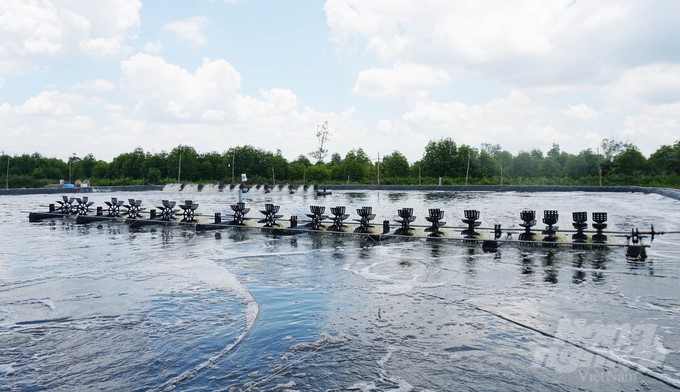
Many individuals and cooperatives in Dong Nai province are investing methodically in whiteleg shrimp farming. Photo: Le Binh.
Currently, climate change strongly affects the productivity and output of farmed aquatic animals, especially giant tiger prawn and whiteleg shrimp. Not to mention, the output of shrimp and fish is unstable, and costs increase, causing many Dong Nai aquaculture households to suspend or narrow their production scale. Therefore, the Dong Nai Department of Agriculture and Rural Development determined that it is necessary to focus on investing in aquaculture with the application of high technology to enhance productivity and quality, increase income, and contribute to limiting environmental pollution.
The entire Dong Nai province currently has nearly 1,700 hectares of brackish water aquaculture, mostly shrimp with an output of approximately 5,000 tons/year and mainly concentrated in Nhon Trach, Long Thanh, and Tan Phu districts.
In recent years, many brackish water shrimp farming households have boldly invested in technology and techniques in shrimp farming to reduce production costs and increase competitive advantage in the market. New techniques have been put into use, such as farming in canvas-lined ponds, aeration systems, automatic water filtration systems, etc.
A typical high-tech shrimp farming model in Dong Nai is Thanh Cong Agriculture and Fisheries Service Cooperative in Phuoc An commune, Nhon Trach district. Currently, the Cooperative has eight members, raising high-tech whiteleg shrimp on an area of 30 hectares.
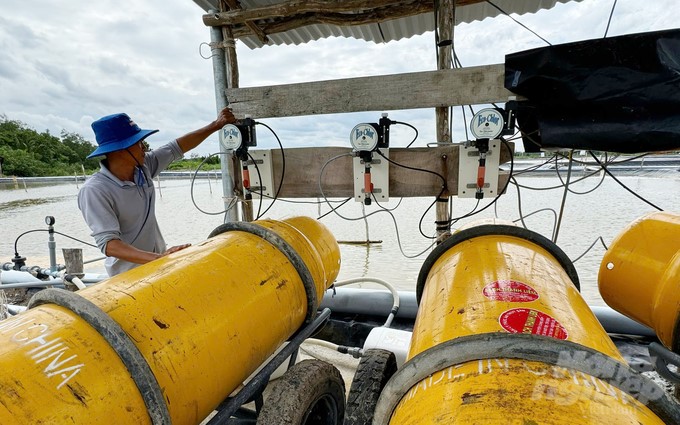
Aeration system at Thanh Cong Agriculture and Fisheries Service Cooperative. Photo: Le Binh.
According to Mr. Nguyen Huy Binh, Director of the Cooperative, thanks to the application of technology, the Cooperative's ponds are invested more methodically, helping to increase the number of farming crops, and the harvest output in the year also increases many times compared to traditional pond farming. Thanks to that, the yield ranges from 25 to 40 tons/ha/crop.
"We invest carefully in seeds, ponds lined with canvas at the bottom with a one-way water supply and drainage system, and waste treatment to ensure the environment. Thanks to the support of advanced technologies and production linkages, we can better control the disease problem and not worry about crop loss like before," Mr. Binh shared.
In addition, Dong Nai's agricultural sector also encourages aquaculture farmers to follow VietGAP standards. According to Ms. Do Thi Thu Thuy, in charge of the Dong Nai Sub-Department of Fisheries, up to now, the province has built and certified 14 aquaculture areas as meeting VietGAP standards, with a total area of 408.05 hectares and 80,788 m3 of rafts and tanks. "The province's total seafood output meeting VietGAP standards is 15,675 tons/year. The Sub-Department is also encouraging people to expand farming areas according to VietGAP standards," said Ms. Thuy.
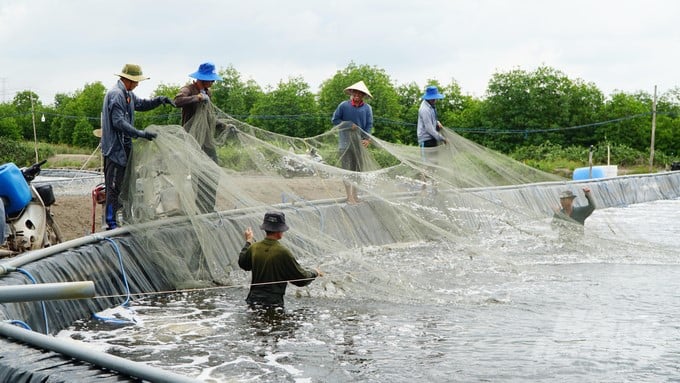
Shrimp farming model according to VietGAP standards in Phuoc An commune, Nhon Trach district. Photo: Le Binh.
Currently, aquaculture in cages on the Dong Nai River and Tri An Lake accounts for quite a large number, with 1,100 rafts and more than 3,800 cages. Mr. Tran Lam Sinh, Deputy Director of the Dong Nai Department of Agriculture and Rural Development, said that fish farming in cages is being greatly affected by natural disasters. In particular, during the rainy season, farming cages are often more or less damaged. This not only incurs costs for people but also affects the environment.
"We have worked with many suppliers to find locally suitable HDPE cages and rafts for more sustainable development. At the same time, the Department of Agriculture and Rural Development also has recommendations to support people or provide buying incentives for sustainable development and reducing production costs each year," said Mr. Sinh.
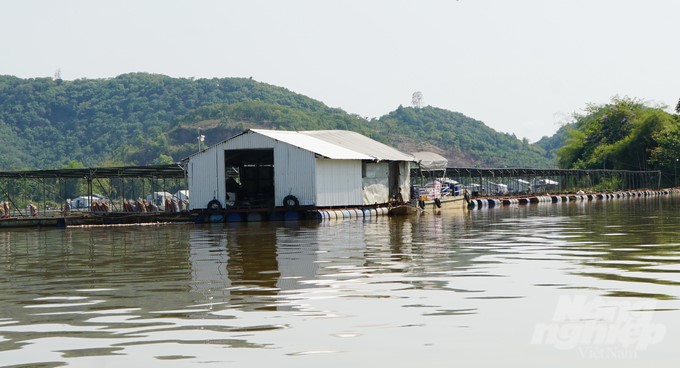
Fish cages on rivers also consider the use of durable, environmentally friendly materials. Photo: Le Binh.
According to the Dong Nai Department of Agriculture and Rural Development, in the first 6 months of 2024, total seafood output reached nearly 39,700 tons, an increase of more than 4.9% over the same period, reaching the highest increase in the fields of crop production and livestock farming. Therefore, orienting and encouraging investment in high-tech aquaculture is an inevitable trend, bringing high efficiency. In the coming time, Dong Nai will continue to have policies to increase investment attraction and expand quantity and quality in the fisheries sector.
Translated by Thu Huyen
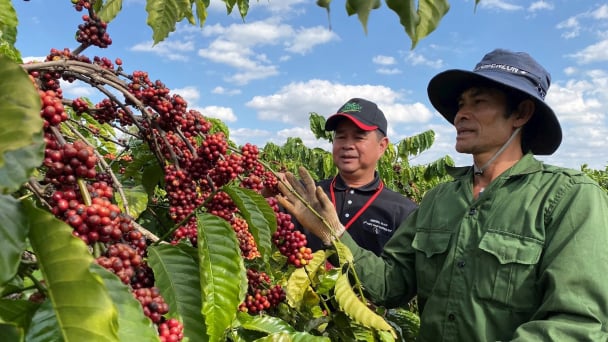
(VAN) Businesses emphasize fairness and equality when integrating social factors into their sustainable development strategies.
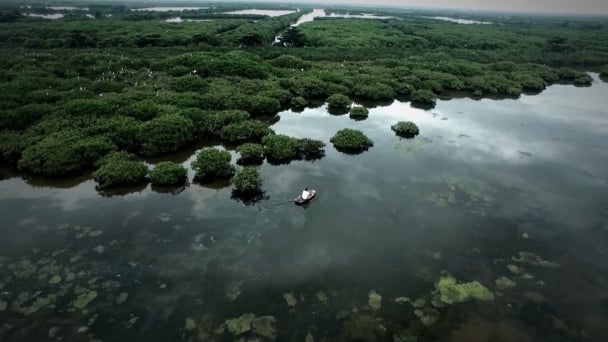
(VAN) French organizations and enterprises propose that Thai Binh province provide potential and long-term cooperation contents related to climate change response and green industrial development.
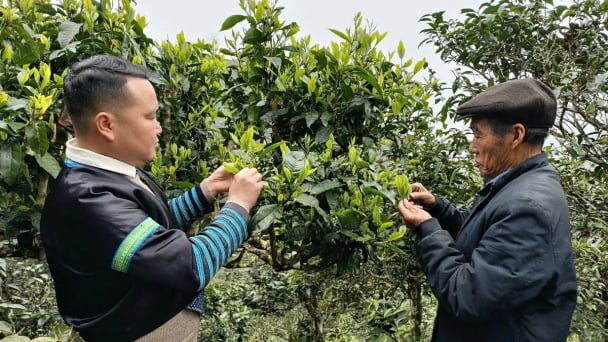
(VAN) Shan Tuyet tea is considered a 'heavenly treasure'. The H'mong people allow the tea to grow naturally, adhering to organic production principles, with the aim of exporting the product.
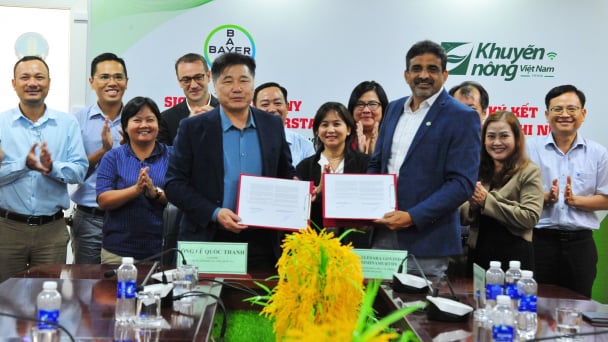
(VAN) Bayer Vietnam and the National Agricultural Extension Center have signed a partnership agreement to expand the development of effective and safe farming models for rice, durian, and coffee.
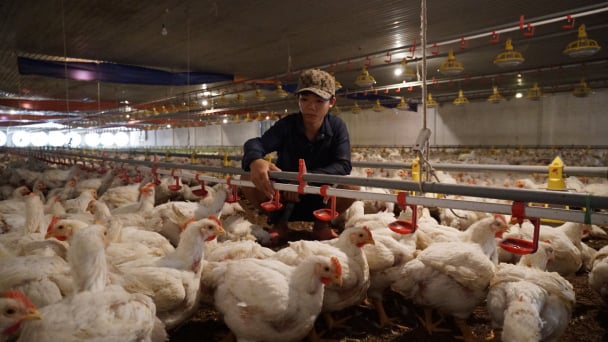
(VAN) Tay Ninh province possesses all the favorable conditions, from natural advantages to geographic location and social harmony, to drive economic development, particularly in attracting investment and advancing modern livestock farming.
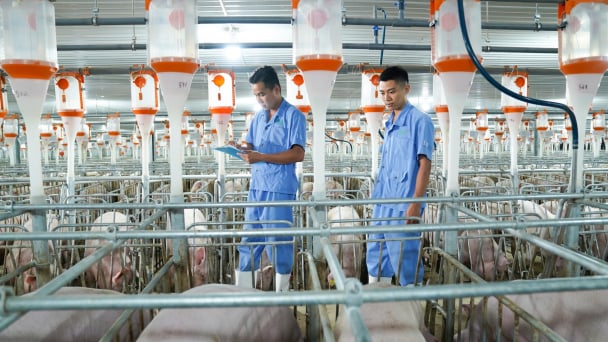
(VAN) Notably, every link in BAF's entire closed livestock value chain Feed - Farm - Food has received international certification.
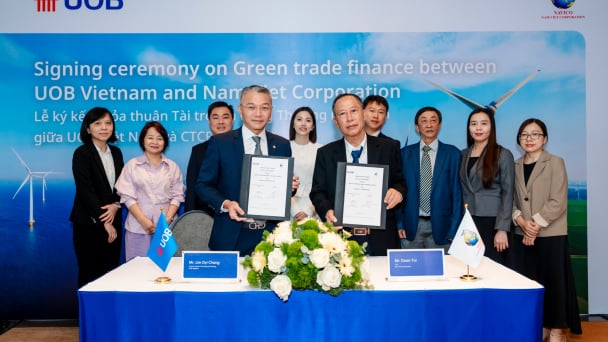
(VAN) UOB Vietnam has recently signed a green credit agreement with NAVICO to develop sustainable aquaculture that meets international standards.